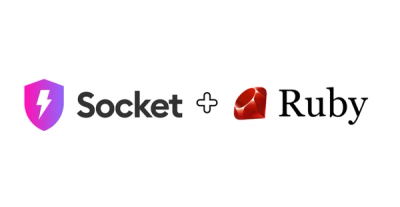
Product
Rubygems Ecosystem Support Now Generally Available
Socket's Rubygems ecosystem support is moving from beta to GA, featuring enhanced security scanning to detect supply chain threats beyond traditional CVEs in your Ruby dependencies.
dynamodb-service
Advanced tools
Managing records saved in Dynamodb
I want to save scheduling information
{
recurrence: string,
time: string,
timeZone: string,
mediumType: enum, // SLACK, GMAIL, ...
meta: json // ex: { channelId, slackBotId, slackBotName }
}
Create node package that exposes a DynamoDBService along with CRUD methods.
const DynamoDBService = require('dynamodb-service');
// profile = 'not-default' // => this is the aws credentials found in `.aws/credentials` file
let dynamoDBService = new DynamoDBService(primaryKeyName, tableName, profile);
dynamoDBService.create(data) // => @return Promise
[default]
aws_access_key_id = your_access_key
aws_secret_access_key = your_secret_key
[not-default]
aws_access_key_id = your_access_key
aws_secret_access_key = your_secret_key
Other ways to provide credentials
aws dynamodb create-table --table-name scheduling-configuration \
--attribute-definitions AttributeName=configurationId,AttributeType=S \
--key-schema AttributeName=configurationId,KeyType=HASH \
--provisioned-throughput ReadCapacityUnits=1,WriteCapacityUnits=1 \
--query TableDescription.TableArn --output text \
--region=us-east-1 --profile default
# the tableName 'scheduling-configuration' can be anything
# note the 'AttributeName', you can change 'configurationId' to whatever you want
The TDD way
mkdir dynamodb-service
cd dynamodb-service && npm init
// follow the prompt and provide all required info
mkdir test
// we first create a test file for create method
// it should take in data and return a Promise that resolve with
// the saved record
// ./test/create.test.js
let DynamoDBService = require('../index.js');
let tableName = 'scheduling-configuration',
primaryKeyName = 'configurationId';
let dynamodbService = new DynamodbService(tableName, primaryKeyName);
let data = {
recurrence: 'string',
time: 'string',
timeZone: 'string',
mediumType: 'SLACK', // SLACK, GMAIL, ...
meta: { channelId: 'string', slackBotId: 'string', slackBotName: 'string' }
};
dynamoDBService.create(data)
.then(createdRecord => console.log(createdRecord))
.catch(e => console.error(e.message || 'error', e));
# you should get errors
node test/create.test.js
index.js file// ./index.js
'use strict';
const DynamoDBService = require('./src/services/DynamoDBService');
module.exports = DynamoDBService;
DynamoDBService file# ./src/services/DynamoDBService.js
// we are using es6 classes
// ./src/services/DynamoDBService.js
...
constructor(tableName, primaryKeyName, profile) {
this.tableName = tableName;
this.primaryKeyName = primaryKeyName;
let credentials = new AWS.SharedIniFileCredentials({profile});
AWS.config.credentials = credentials;
this.DYNAMO_DB = new AWS.DynamoDB.DocumentClient();
}
...
// ./src/services/DynamoDBService.js
...
let params = {
TableName: this.tableName,
Item: data
};
return this.dynamoDb.put(params).promise()
.then((/* success */) => this.read(data[this.keyName]));
...
// ./src/services/DynamoDBService.js
...
let Key = {};
Key[this.keyName] = id;
let params = {
TableName: this.tableName,
Key
};
return this.dynamoDb.get(params).promise()
.then(function (response) {
return response.Item;
});
...
FAQs
Managing records saved in Dynamodb
The npm package dynamodb-service receives a total of 3 weekly downloads. As such, dynamodb-service popularity was classified as not popular.
We found that dynamodb-service demonstrated a not healthy version release cadence and project activity because the last version was released a year ago. It has 1 open source maintainer collaborating on the project.
Did you know?

Socket for GitHub automatically highlights issues in each pull request and monitors the health of all your open source dependencies. Discover the contents of your packages and block harmful activity before you install or update your dependencies.

Product
Socket's Rubygems ecosystem support is moving from beta to GA, featuring enhanced security scanning to detect supply chain threats beyond traditional CVEs in your Ruby dependencies.

Research
The Socket Research Team investigates a malicious npm package that appears to be an Advcash integration but triggers a reverse shell during payment success, targeting servers handling transactions.

Security Fundamentals
The Socket Threat Research Team uncovers how threat actors weaponize shell techniques across npm, PyPI, and Go ecosystems to maintain persistence and exfiltrate data.